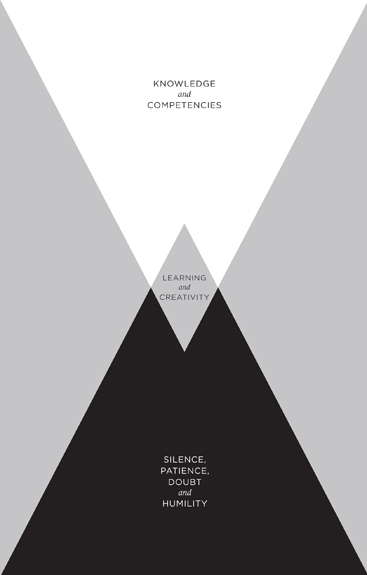5.
COMPASSION AND EMPATHY
As we’ve seen, at the edge between the known and the unknown we come up against a myriad uncomfortable, unpleasant, and sometimes painful, feelings. Doubt, anxiety, anger and shame arise spontaneously and unexpectedly. The unknown questions and challenges our self-image of being competent and in control. Faced with our own incompetence, it is often easier to avoid the discomfort we are feeling than face an image of ourselves as deeply flawed human beings.
Becoming more aware of what happens to us at the edge enables us to become more accepting of the insecure, controlling, struggling or incompetent parts of ourselves – parts that we would rather avoid acknowledging, or pretend are not there. That awareness involves a deep and unconditional acceptance of our own weaknesses, failings and deficiencies; being at peace with ourselves and who we are, the whole of us, not just the parts that we like and that we are comfortable with. Experiencing those parts of ourselves that feel awkward, that are not fully known to us, requires an openness and generosity towards ourselves. It requires self-compassion.
Compassion is different from empathy. It goes beyond the capacity to put ourselves in other people’s shoes to an active openness to our and others’ feelings and experiences.
According to Buddhist teacher Pema Chödrön, “Compassion is not a relationship between the healer and the wounded. It’s a relationship between equals. Only when we know our own darkness well can we be present with the darkness of others. Compassion becomes real when we recognize our shared humanity.”106
Jeff Weiner, CEO of LinkedIn, is known to talk about compassion as the centrepiece of his management style. He describes how compassion requires slowing down and taking the time to truly listen to others. For him, being compassionate means understanding where people are coming from, and caring about the struggles they’re facing and the baggage that they’re carrying.
Steven: A few years ago I was doing a coaching program where participants were asked what their life purpose was. Challenged by the magnitude of such a request to ‘give my life purpose’, I turned to my coach, who advised me to start much smaller and closer-in. Rather than a grandiose purpose, such as bringing love into the world, my purpose became ‘to be a little kinder and more compassionate to myself when I struggle’. We can often be far harsher with ourselves than we would be with other people. Instead we can acknowledge that as human beings we are perfectly imperfect and cannot manage everything well, all of the time. Our challenge in self-compassion is to learn to be a better friend to ourselves.
The compassion we show for ourselves also allows us to be compassionate with others in their suffering. Everybody has their own challenges and struggles, of which we often know nothing. This idea was recently used in a film made by the world-famous hospital The Cleveland Clinic. The film explores how we would treat each other if only we knew what was happening for the other person, both good and bad.107 This quality of empathy is a resource that enables us to connect, but can also lead to creativity and innovation as we understand the needs of others more clearly.

